Partnering with Washington Tribes to Foster Native American Futures
Catching up with alumni of the Tribal Gaming and Hospitality Management Certificate Program

Students of the Foster School’s Tribal Gaming and Hospitality Management Certificate Program
Growing out of the UW Tribal Leadership Summit, the Foster School’s Tribal Gaming and Hospitality Management Certificate Program develops the skills of employees moving into front-line management positions. The program’s curriculum is developed in partnership with leaders of Tribal gaming enterprises, and in partnership with the UW Department of American Indian Studies, whose majors are invited to participate.
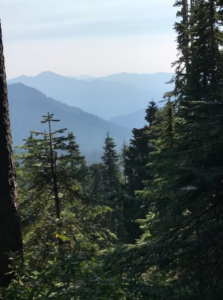
Photograph by Tanyia Stehl, alumni of the Foster School’s Tribal Gaming and Hospitality Management Certificate Program
The program’s goal is to help prepare the next generation of leaders for Tribal casinos in the Pacific Northwest.
The 10-credit curriculum includes courses in management and leadership, marketing, accounting and finance with a capstone course that addresses issues specifically relevant to the Tribal gaming business. With class sessions held onsite at Tribal casinos throughout Washington, the Tribal Gaming and Hospitality Management Certificate Program creates a unique and impactful learning environment.
In honor and celebration of Native American Heritage Month, we caught up with several alumni of the program.
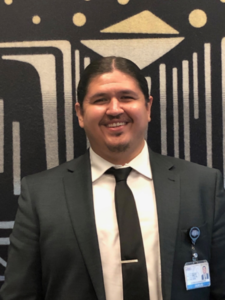
Jairus Wood, Snoqualmie Tribe
Jairus Wood
What’s your name? Where are you from?
My name is Jairus Enick Wood — born and raised in Seattle, Washington.
What tribe do you represent?
I represent the Snoqualmie Tribe.
What employer/hospitality/casino do you represent?
I represent Snoqualmie Casino.
Can you describe your professional role, and the work you do at your organization?
I work in the Players Club as a Supervisor. We handle daily responsibilities from providing amazing guest service, signing up new guests & sharing benefits/promotions to being an all-in-one stop for guests.
Did the Management Certificate Program and your experience at Foster impact how you approach your job, career, and future?
It did, it gave me a new perspective on what it takes to not only think of good ideas but how to implement them. This program has developed my approach on what it means to collaborate creatively as a team, to think strategically on a bigger scale.
What advice do you have for other Indigenous/Native American people looking to get into hospitality, management, and business?
My advice is to not overthink it, and challenge yourself. Be patient and allow yourself room to grow. You’ll feel out of your comfort zone but that’s what it’s all about.
What is something special, or something important to you, about your tribe, your hometown, and who you are?
What’s important to me is learning as much as I can in every aspect of hospitality, management and business. As for my tribe, it’s imperative I take advantage of all of these opportunities many others never get so that I can be better prepared as a leader when my time comes to serve my tribe.
Who is someone you admire?
My wife, Maria. She’s been so supportive of my journey at Sno Casino and has always pushed me to keep going. She only wants the best for me and it’s something I appreciate every single day. Another person I admire is Takako Wright, the Tribal Development Manager at Snoqualmie Casino. She has always steered me in the right direction since I started at Sno casino. Always on the lookout for a great opportunity for us tribal members.
What do you want the Foster Community to know about Indigenous/Native Americans in business?
I want them to know that we’re still here, we’re present and ready to learn.
Stephanie Koplin
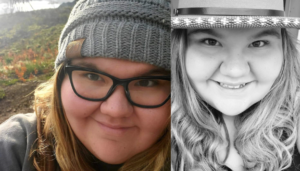
Stephanie Koplin, Snoqualmie Tribe
What’s your name? Where are you from?
My name is Stephanie and I am from Snoqualmie, Washington.
What tribe do you represent?
I am an enrolled member of the Snoqualmie Tribe. I work for Snoqualmie Gaming Commission, which is the regulator for the Snoqualmie Casino.
Did the Management Certificate Program and your experience at Foster impact how you approach your job, career, and future?
When I attended the Management Certificate Program, I was a front line employee in the Food and Beverage department. The Management Certificate Program was such a blessing I met some incredible people who I remain in contact with and being able to see behind the scenes of other operations in Indian Country was truly a unique experience. The program was a great opportunity to expand my horizons. I have always felt great pride working for my Tribe’s casino. Now I assist in protecting the Tribe’s assets and that is the best feeling in the world.
What advice do you have for other Indigenous/Native American people looking to get into hospitality, management, and business?
If you are thinking about joining the tribal gaming industry, remember that all of the work you do is not for a multimillionaire CEO buying another yacht, instead it is for the people. The Tribe you work for is able to help assist in childcare, teaching the next generation their culture, providing for its Elders because without them we would not have had a future. I did not think I would stay in the industry and now I cannot imagine ever leaving the industry.
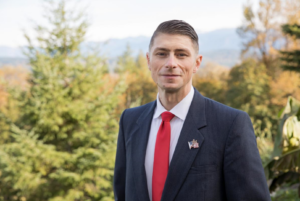
Troy Wyatt, Snoqualmie Tribe
Troy Wyatt
What’s your name? Where are you from?
My name is Troy Wyatt and I was born and raised in the Pacific Northwest.
What tribe do you represent?
I represent the Snoqualmie Tribe.
What employer/hospitality/casino do you represent?
I represent Snoqualmie Casino.
Can you describe your professional role, and the work you do at your organization?
I manage the entertainment program at Snoqualmie casino. A typical day includes working with my team to program our entertainment calendar, planning logistics and production for the upcoming acts we host.
Did the Management Certificate Program and your experience at Foster impact how you approach your job, career, and future?
The Foster School of Business Management Certificate Program helped me in many ways both professionally and personally. This particular program helped me exercise my time management abilities, practice my team collaboration skills, and elevate my project management capabilities. Problem solving with this preselected group of industry professionals fostered my interpersonal talents and because of the time spent with them, I will always work in a team environment with a more collaborative approach.
What advice do you have for other Indigenous/Native American people looking to get into hospitality, management, and business?
The best advice I have for any Indigenous/Native American people looking to get into hospitality, management or business is to try and be the hardest working individual in the room. That and you should never do this for the money.
What is something special, or something important to you, about your tribe, your hometown, and who you are?
I feel that it is important to think creatively. So many people lose their creativity over time. I believe that staying creative helps our tribe gain the edge and sustain the resources that were unobtainable to our ancestors.
Who is someone you admire?
I admire past and present Snoqualmie tribal leaders such as Stanford Le, Brian Decorah, Takao Wright, Bob De los Angeles and Carlyon Lubenau. Additionally, I admire influential figures such as John Kennedy, Margaret Thatcher, Lyda Conley, Annie Dodge Wauneka, and Henry Ford, who once said, “He who gives will never be without.”
What do you want the Foster Community to know about Indigenous/Native Americans in business?
I would like the Foster Community to know that us Indigenous/Native Americans are just getting started.
Any people/causes/organizations that you’d like to shout out?
I’d like to shout out the following causes and organizations: Nativeknot.com, Indian Gaming Magazine, The Warrior Woman Project.
Tanyia Stehl
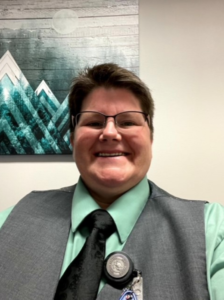
Tanyia Stehl, Casino Shift Manager, Angel of the Winds Casino Resort
What’s your name, and where are you from?
My name is Tanyia and I was born and raised in Illinois. After fulfilling my active-duty commitment with the Marines, I had an opportunity to move to Washington state. I have to say that I’m glad I didn’t pass that up, so much beauty here!
What Tribe do you represent? What employer do you represent?
I work at Angel of the Winds Casino Resort, owned by the Stillaguamish Tribe.
Can you describe your professional role, and the work you do at your organization?
I am a Casino Shift Manager, responsible for the leadership, management, and supervision of all aspects of casino operations.
I ensure the highest standards of customer service and hospitality are maintained and delivered through direct communication and interaction with customers/guests and employees. I assume responsibility for regulatory and policy compliance, supervision, staffing, and relations of the various departments and their employees.
As the Casino Shift Manager, I am required to display the highest degree of professionalism, judgment, and decision making in all customer and employee interactions while championing the goals and priorities of the Casino and Tribe in a manner that reflects and upholds the Casino and Tribal Community’s vision, mission and values.
Did you have any specific valuable insights or takeaways for you and your organization from the UW Tribal Gaming Financial Management Certificate Program?
The program gave me new insight on how decisions are made when contemplating adding a new department to an organization. Getting a chance to learn how and why decisions are made on the financial side has given me another key piece of operations. I have always been able to step back and look at the big picture so having this missing component of it makes it even easier to visualize.
What advice do you have for other Indigenous/Native American people looking to get into hospitality, management, and business?
Have patience, compassion, openness to honest feedback from anyone, empathy and an unquenching thirst for knowledge of the profession you choose. The most important thing is admitting when you’ve made a mistake and being open about it; no one is perfect so don’t try to be or expect those around you to be either.
What is something special, or something important to you, about your tribe, your hometown, and who you are?
I am proud to work for the Stillaguamish Tribe. They take such good care of their tribal members, employees and community. Their generous donations to the community, emergency services and schools shows their commitment to this community to making it a better place.
Who is someone you admire?
My wife Natalie, without her I would not be the person I am today.
What do you want the Foster Community to know about Indigenous/Native Americans in business?
Working for a tribal nation adds a great sense of fulfillment and purpose.
Any people/causes/organizations that you’d like to shout out?
Angel of the Winds Casino Resort. Thank you for the educational opportunity.
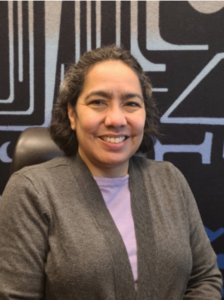
Takako Wright, Snoqualmie Tribe
Takako Wright
What’s your name? Where are you from?
Takako Wright, North Bend, Washington.
What tribe do you represent?
Snoqualmie Indian Tribe.
What employer/hospitality/casino do you represent?
Snoqualmie Casino.
Can you describe your professional role, and the work you do at your organization?
Tribal Development Manager — I am the liaison between the casino, Tribal Government, Tribal members, and the community. I get to work with fellow Tribal Members at the casino, to help us and the tribe succeed.
Did the Management Certificate Program and your experience at Foster impact how you approach your job, career, and future?
Yes. I gained a better understanding of the Financial side of gaming, helped me guide other participants to roles that fit their skills, and shared the importance of what the program has to offer and be open to new ideas and solutions, not only in learning about gaming, management, marketing, and finance, but also in creating a network with other remarkable people.
Did you have any specific valuable insights or takeaways for you and your organization from the UW Tribal Gaming Hospitality Management Certificate Program?
We have been fortunate to participate from the very beginning and have had twenty-three (23) participants complete the program. Many of them have earned promotions or transitioned into different roles. Others have taken their learning and ventured on to different paths. Knowing these participants have a continued desire to learn, a network of supports and resources to draw from has been a positive outcome to a great program.
What advice do you have for other Indigenous/Native American people looking to get into hospitality, management, and business?
Many different pathways exist to get into hospitality, management and business. Transferrable skills come from almost any opportunity. Always continue learning.
What is something special, or something important to you, about your tribe, your hometown, and who you are?
I am thankful to be part of a tribe that is resilient, resourceful, and reaching for the stars. It’s a joy to help others discover their paths, to get the resources they need, and to know that we are each doing our part to make our tribe and our community stronger.
Who is someone you admire?
My family, for starting the pathways we can travel on now; my many mentors who have offered encouragement along the way; and my fellow tribal members who I work with daily – they are a great inspiration for what the next generation of leadership can look like.
What do you want the Foster Community to know about Indigenous/Native Americans in business?
We are resourceful, creative and resilient.
Any people/causes/organizations that you’d like to shout out?
Chief Seattle Club, Encompass, FareStart, Page Ahead, The Trail Youth.
